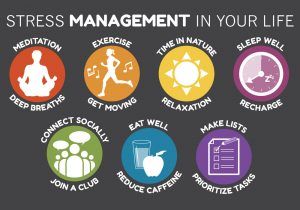Stress is a common part of life. Whether it's due to work, relationships, or personal issues, everyone experiences stress at some point. However, prolonged exposure to stress can have negative effects on our physical and mental well-being. That's why it's important to learn and practice stress management techniques to control and reduce stress levels.
Identify the Source of Stress
The first step in managing stress is identifying its source. Is it due to work-related factors, personal relationships, financial difficulties, or health issues? Once you have identified the source, you can work towards finding appropriate strategies to deal with it.
Practice Relaxation Techniques
Relaxation techniques are effective in reducing stress levels. These techniques include deep breathing exercises, progressive muscle relaxation, meditation, and visualization. Taking a few minutes each day to practice these relaxation techniques can significantly reduce stress and promote a sense of calmness.
Engage in Physical Exercise
Engaging in regular physical exercise is not only beneficial for our physical health but also for stress management. Exercise releases endorphins, which are known as "feel-good" hormones. These endorphins help reduce stress levels and improve mood. Whether it's going for a jog, practicing yoga, or participating in team sports, incorporating physical activity into your routine can greatly alleviate stress.
Manage Time Effectively
Poor time management can lead to increased stress levels. By prioritizing tasks, creating schedules, and setting realistic deadlines, you can effectively manage your time and reduce stress. Breaking down tasks into smaller, manageable steps can also prevent feelings of being overwhelmed.
Establish a Support System
Having a support system in place can be instrumental in managing stress. Surrounding yourself with understanding and supportive individuals can provide emotional comfort and practical assistance when needed. Whether it's friends, family, or professional support groups, reaching out to others can help you navigate through stressful situations.
Practice Healthy Lifestyle Habits
Adopting healthy lifestyle habits can have a positive impact on stress management. Eating a balanced diet, getting adequate sleep, and avoiding excessive consumption of alcohol and caffeine can contribute to overall well-being. Taking care of your physical health can better equip you to handle stressful situations.
Avoid Unhealthy Coping Mechanisms
In times of stress, it can be tempting to resort to unhealthy coping mechanisms such as excessive eating, smoking, or substance abuse. However, these behaviors may provide temporary relief but can ultimately intensify stress and have negative long-term effects. Instead, focus on healthy coping strategies like talking to a trusted friend, writing in a journal, or seeking professional help if needed.
Create a Relaxing Environment
Your physical environment can significantly impact your stress levels. Ensure that your living and working spaces are organized, clutter-free, and provide a sense of calmness. Adding elements such as plants, soothing colors, and natural light can further enhance relaxation.
Take Breaks and Practice Self-Care
In the midst of a busy schedule, it's crucial to take regular breaks and practice self-care. Engage in activities that bring you joy and help you unwind, such as listening to music, reading a book, taking a bath, or spending time in nature. Prioritizing self-care allows you to recharge and better deal with stressors in your life.
Conclusion
Stress is an inevitable part of life, but by incorporating these stress management techniques into your routine, you can effectively reduce its impact and promote overall well-being. Identifying the source of stress, practicing relaxation techniques, engaging in physical activity, managing time effectively, establishing a support system, adopting healthy lifestyle habits, avoiding unhealthy coping mechanisms, creating a relaxing environment, and prioritizing self-care are all key strategies to manage stress effectively.


